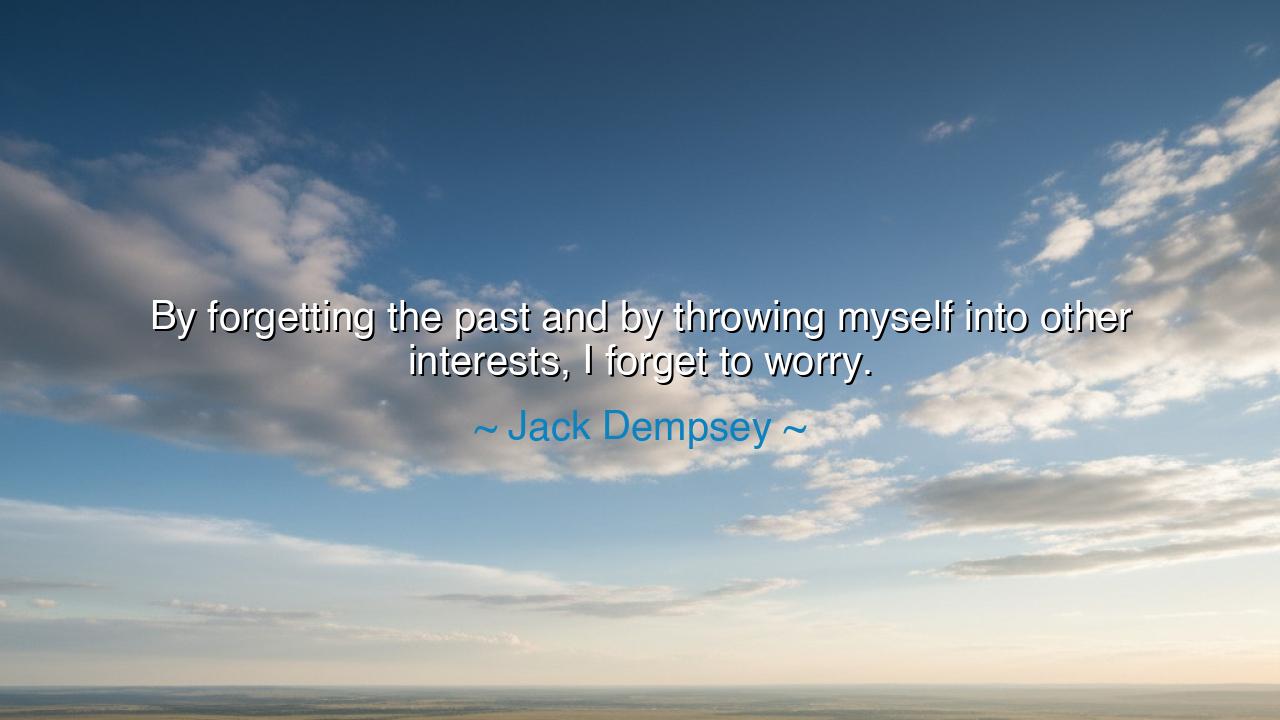
By forgetting the past and by throwing myself into other






Jack Dempsey, the great champion of the boxing ring, once revealed a truth not only for warriors but for all mankind: “By forgetting the past and by throwing myself into other interests, I forget to worry.” These words carry the weight of a fighter who knew both triumph and defeat, who tasted glory and despair, yet refused to let the past enslave his present. In them lies a wisdom as old as time: the mind that clings to yesterday is shackled, but the one that releases yesterday finds freedom in new purpose.
The ancients too echoed this wisdom. The Stoics taught that the past is beyond our command—it lies already in the hands of fate, immutable and unchangeable. To dwell upon it with worry is to chain the soul to what cannot be altered. Epictetus urged his disciples to fix their attention on what can be done here and now, for only in the present lies power. Dempsey’s words echo this philosophy: forget the past, not with bitterness, but with the quiet courage of moving forward into fresh labor and new horizons.
In his own life, Dempsey knew the sting of loss. After his reign as heavyweight champion, he suffered defeat at the hands of Gene Tunney, and with it came public criticism and doubt. He might have brooded, haunted forever by what was lost. Yet he chose another path. He cast aside the shadows of the ring and threw himself into new pursuits—business, public life, and service during World War II. By giving himself to fresh interests, he lessened the grip of memory. He discovered that in purpose, worry fades, and in activity, sorrow loses its sting.
History offers other witnesses to this truth. Think of Theodore Roosevelt, who after the death of his wife and mother on the same day, could have been crushed under grief. Instead, he went west to the Dakotas, throwing himself into the rugged life of a rancher and cowboy. By forgetting the past through new labor, he tempered his spirit, and from that crucible emerged a man who would one day lead a nation. His life declares that the remedy for worry is not in idle brooding, but in hurling oneself into worthy interests that renew the spirit.
To dwell endlessly on what has already passed is to live among ghosts. Worry feeds on memory, circling again and again around what cannot be undone. But the mind that is given to new work, new love, new learning, finds its energy consumed by creation, not by fear. Thus, Dempsey teaches us that forgetfulness of the past is not weakness, but wisdom, and that interest in the present is the medicine for worry.
Yet let us be clear: forgetting the past does not mean denying it. The past has its lessons, and those lessons should be remembered. But the wounds and regrets, the endless “what ifs,” must be cast aside. To remember only for wisdom and not for worry—that is the noble path. For life, like a boxer’s match, is fought round by round; yesterday’s punches cannot be changed, but today’s stance and today’s blows can still win the day.
The lesson, then, is this: when burdened by worry born of memory, seek not to dwell in the ruins of yesterday. Instead, throw yourself with all your strength into pursuits that lift your spirit and serve others. Let new interests fill the space once occupied by regret. In labor, in learning, in art, in service, you will find the mind grows quiet and the heart grows strong.
Practical action flows naturally: When worry from the past weighs upon you, choose a new endeavor—read a new book, take up a craft, serve someone in need, set your hands to work. Train yourself to turn energy from brooding into building. Each time you feel the shadows return, move toward the light of new interest. In this way, as Jack Dempsey teaches, you will forget to worry—not by force of will alone, but by filling your life with the living fire of the present.






AAdministratorAdministrator
Welcome, honored guests. Please leave a comment, we will respond soon